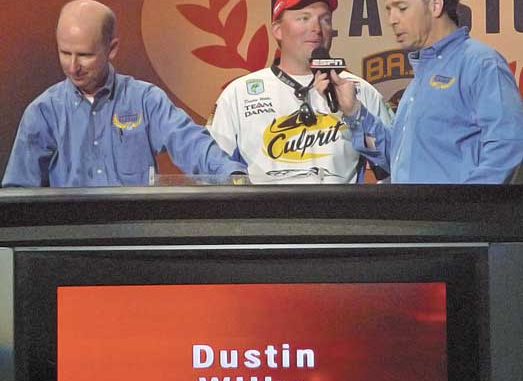
Fishing slow.
I never thought I’d write about this. Fishing slowly is many times the best way to catch bass. While it is nearly impossible to find bass quickly by fishing slowly, catching good fish every day sometimes depends on a slow, deliberate fishing pace.
It took a big mistake at the recent Bassmaster Classic on Louisiana’s Red River to bring myself to this conclusion. It pains me to say, “Dragging a bait on the bottom is sometimes the dominant pattern and the best way to catch big fish.”
There, I said it.
What follows serves to remind me of this.
My strategy for the Classic was simple: run far away from the crowds and have unfished water that would hold up for three days. I knew it would take around 18 pounds of fish a day to win.
Since this was the Classic, you can take big chances to try and win, because no points are involved as they are in the regular season.
I thought there would be some big bags caught out of community holes, but they would not last. I did not want to go to any community holes during competition for fear of being tempted to return only to catch little on the second or third day. I thought my best chance was to have three quality hours a day where there is little or no fishing pressure.
The Red River is a shallow, muddy place full of backwater with three pools (areas between locks and dams) to fish. The majority of fishermen stayed on four community areas. To get to where I fished, you had to go though two locks and run about 75 miles each way. With locks and running time, that left about three hours to fish.
It’s quite risky limiting yourself to three hours, but I’d rather have three quality hours than eight hours with a mob of boats around. I still think it is a good idea, and I’d do it again.
Competition began on Day One. It was very cold and sunny, with nearly calm conditions. I had everything timed down to the second. I had a little time to fish in-between locks before they closed, so I took the opportunity. I caught one fish on the way to my primary area by fishing an RJA Custom crankbait. I was in a rush trying to fish in between locks and that really set a bad trend. By the time I got to my primary fishing area, I was still rushing. I got to my first spot, a small rock pile, and immediately lost a good fish on a jig with a Culprit tailgate special trailer. About that time, the ESPN helicopter hovered nearby, making me think it would scare the fish, so I left after just two more casts. I rushed to the next spot, a laydown, fishing it quickly as well, with no bites.
On and on for the next three hours, I repeated the same mistake, fishing too fast when the conditions called for slow retrieves and multiple casts to every piece of cover. The conditions were bluebird, with no wind. I know better. The clock is a curious thing. As time slips away, the faster you want to go.
I came in that day with just the one fish, and late at that, as I ran out of gas. The gasoline supplier BASS used did not fill my tanks completely — now that’s an excuse!
The second day, I made sure I had a full tank and returned to the same water, fished slowly and caught 15½ pounds in 1½ hours. I stayed on the one rock pile for 30 minutes and caught two. I slowly and repeatedly cast at logs and caught the rest.
I’m not saying I would have won, but if I had slowed down and fished more thoroughly, I would have had a shot. Lesson learned. Know when to slow down. If it is bluebird and calm, at least try to slow down for a few minutes on each of your best spots. I just learned the hard way — as I do a lot.



Be the first to comment